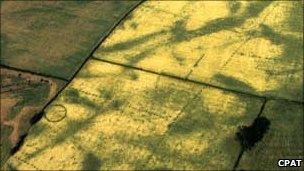Bypass dig uncovers remains in Four Crosses
- Published

A ringed ditch (left), the site of a burial mound, at Four Crosses
Roman, Bronze and Iron Age remains have been unearthed at the site of a new bypass in Powys.
Clwyd-Powys Archaeological Trust (CPAT) said a number of interesting finds had been made, but nothing unusual at Four Crosses, near Welshpool.
Among the earliest sites found is a ringed ditch representing an early prehistoric burial mound.
Roman metalworking and farming activity was also discovered by archaeologists in the village.
CPAT said it would analyse the findings.
Four Crosses has a rich archaeological history, claimed CPAT.
It added that there were crop marks in the area which denoted burial sites.
CPAT's autumn newsletter revealed that archaeologists had uncovered possible Mesolithic activity, Neolithic and Bronze Age burial monuments, Iron Age burials and metalworking, Roman metalworking and farming activity, early medieval burials as well as the better-known monuments such as Offa's Dyke.
It added: "Amongst earliest sites is a ring-ditch with a central grave pit representing an early prehistoric burial mound."
It said up to a dozen or so similar Neolithic and Bronze Age burial mounds were now known in the area of Four Crosses.